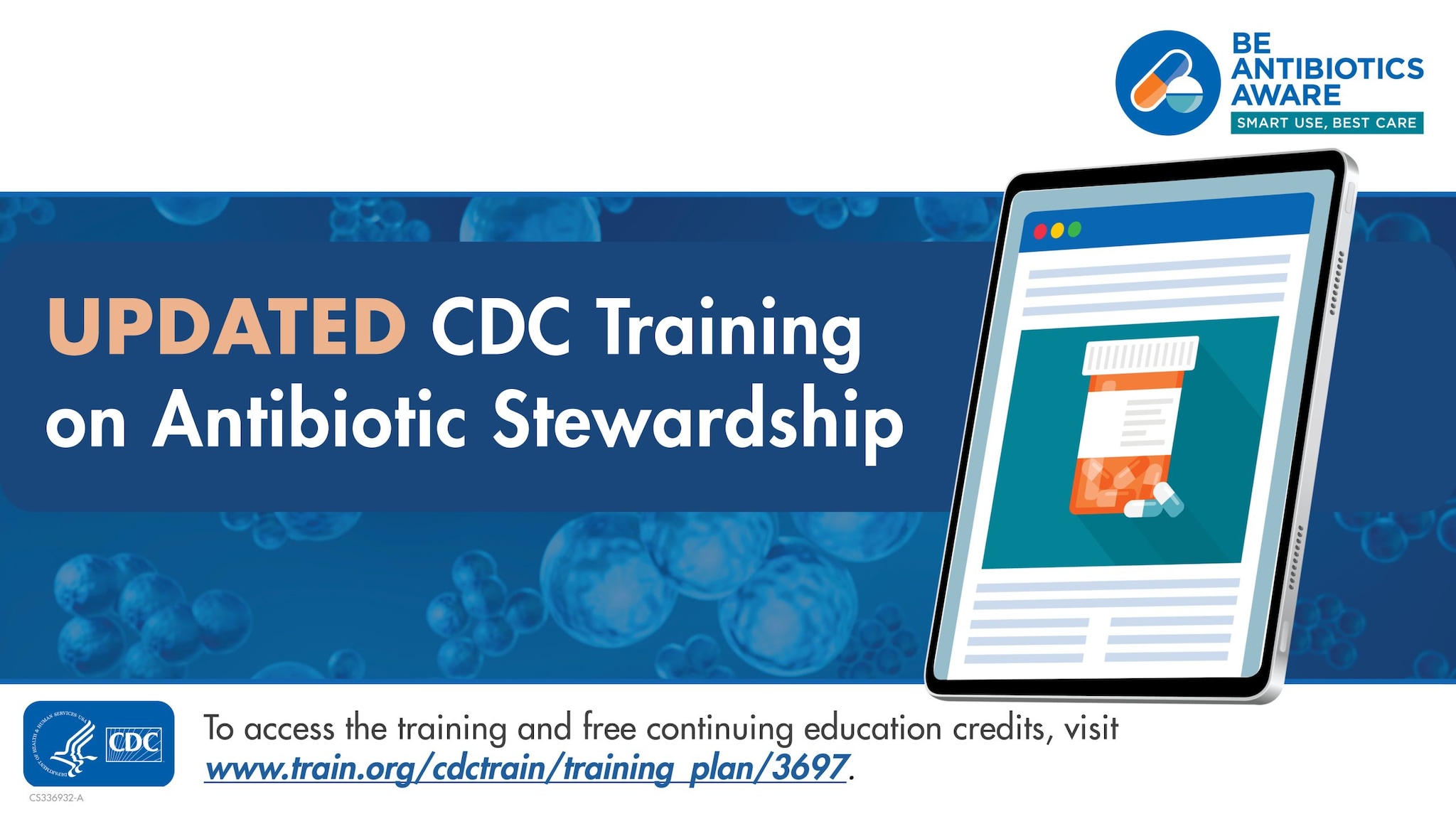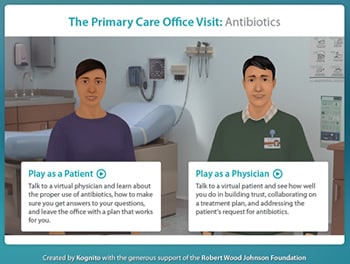Continuing Education and Informational Resources
Several organizations, including the Centers for Disease Control and Prevention, provide continuing education (CE) opportunities related to antimicrobial resistance and stewardship.

CDC Training on Antibiotic Stewardship
This online training course includes multiple modules with free continuing education (CE) credits that can be taken in any order.
Course objectives:
- Describing the role of the healthcare team in antibiotic stewardship
- Updating healthcare professionals on current antimicrobial resistance threats
- Encouraging open discussion among physicians and patients about appropriate antibiotic prescribing
Course highlights include educational content on:
- Antimicrobial resistance threats in the United States
- Risks and benefits of antibiotics
- Benefits and principles of antibiotic stewardship
- Epidemiology of antibiotic use in the U.S. and opportunities for improvement in a variety of clinical settings
- Communication training for clinicians to improve outpatient antibiotic prescribing and use
While this course is primarily for clinicians who prescribe antibiotics, CDC recognizes that everyone plays an important role in improving antibiotic use. Physicians, nurse practitioners, physician associates, certified health education specialists, nurses, pharmacists, and public health practitioners with a master’s degree in public health are eligible to receive free continuing education.
This course fulfills Improvement Activities (IA) Patient Safety and Practice Assessment (PSPA)_23 and PSPA_24 under the Centers for Medicare & Medicaid Services (CMS) Merit-Based Incentive Programs, or MIPS.
- NHSN AU Option: Using Data for Action in Critical Access Hospitals
- The “Advancing Health Equity through Antimicrobial Stewardship workshop” is a healthcare professional educational workshop developed by the Society for Healthcare Epidemiology (SHEA) to identify and address health inequities as they relate to antibiotic stewardship and antimicrobial resistance.
- 4 Moments of Antibiotic Decision Making in Critical Access Hospitals [Video – 59:03]
- AMR Exchange: Addressing Health Inequities by Strengthening Antibiotic Stewardship Webinar [Video – 1:28:29]
- COCA Call: What Clinicians, Pharmacists, and Public Health Partners Need to Know about Antibiotic Prescribing and COVID-19
Tune in to Safe Healthcare: A CDC Webinar Series
CDC, in collaboration with various clinical partners, presents the webinar series, Tune in to Safe Healthcare, which focuses on a variety of infection control and prevention topics. These webinars feature CDC and external experts and serve as a tool to educate healthcare providers on best practices to improve patient safety. Webinars are offered free of cost and some of them offer continuing education.
Webinar topics include CDC and Health Resources & Services Administration (HRSA)’s annual Federal Office of Rural Health Policy webinar on antibiotic prescribing in critical access hospitals, nurse roles in antibiotic stewardship, and more. *CE is available for this resource.
To Prescribe or Not To Prescribe? Antibiotics and Outpatient Infections
This communication training activity from Stanford University provides a practical approach to the management of common outpatient infections through the use of both instructional and interactive videos and patient role plays. National guidelines will be reviewed with emphasis on the most appropriate empiric antibiotic choice and duration of therapy. This course is designed for physicians in family practice, primary care, internal medicine, obstetrics and gynecology, and emergency medicine— as well as pharmacists, nurse practitioners, physician assistants, and allied health professionals. *CE is available for this resource.
The Primary Care Office Visit: Antibiotics

This role-play simulation is designed to help patients and physicians improve their skills in leading real-life conversations about the appropriate prescription and use of antibiotics, improve collaboration at the point of care, and change behaviors. Visit conversationsforhealth.com/antibiotics to build your knowledge and skills by engaging in practice conversations with a virtual patient or physician. *CE is not available for this resource.
Educating Patients About Antibiotic Usage
This 7-minute YouTube video from the New York State Department of Health features sample patient/provider interactions in a video format. Use this tool to develop and refine “talking points” to have more productive conversations about antibiotics with your patients. *CE is not available for this resource.
Medical Students
Below are education opportunities currently available for medical students about antimicrobial resistance and the importance of antibiotic stewardship.
An Antibiotic Stewardship Curriculum for Medical Students
This curriculum focuses on antimicrobial resistance, judicious antibiotic use, and common respiratory tract infections, and is intended for use in U.S. medical schools. It is comprised of didactic lectures, corresponding exam questions, and small group activities with facilitator guides. Didactic lectures are meant for medical students in the pre-clinical years. The small group activities are for students on clinical clerkships.
IDSA 2019 Core Antimicrobial Stewardship Curriculum Self Study for Medical Students
This curriculum prepares medical students to explain the importance of antibiotic stewardship in the care of individual patients and the community at large, model antibiotic stewardship best practices during clinical care of patients in inpatient and outpatient settings, structure a conversation to effect change in the antibiotic prescribing patterns of other providers using techniques based in behavioral psychology, and understand the elements of an effective antibiotic stewardship program.